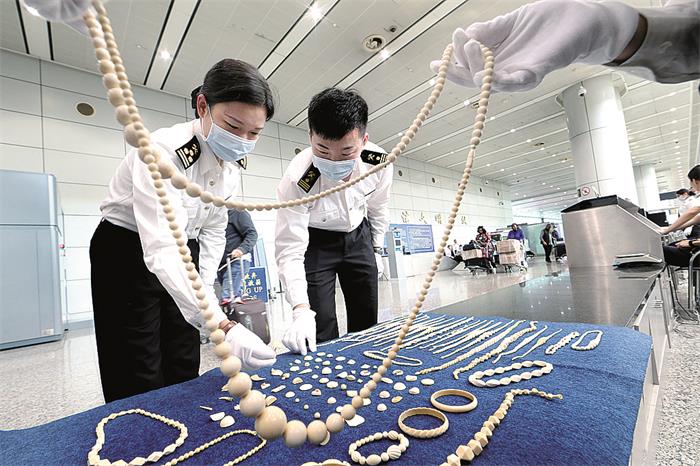
From the People’s Daily app.
This is Story in the Story.
China's ban on elephant ivory trade has had significant results, and now more consumers are choosing not to buy ivory products, according to a recent report.
The report was released by the World Wildlife Fund and TRAFFIC, a nongovernmental organization working on sustainable development and biodiversity conservation.
The report found that public support for the ivory ban is high, with nine out of 10 respondents expressing their support.
All pre-ban legal ivory shops visited by TRAFFIC have stopped selling ivory.
Moreover, TRAFFIC visited 157 markets in 23 cities and found 2,812 ivory products in 345 stores, a decline of 30 percent from last year.
It also found that the average number of new ivory advertisements on websites and social media platforms dropped by 26.6 percent and 10.6 percent, respectively.
Today's Story in the Story will look at why China's ivory ban is hailed as a major development in efforts to protect the world's elephant population.

Seized ivory products are displayed by customs authorities in Guangzhou. Ivory smuggling has fallen due to strict law enforcement in China. (Photo: China Daily)
The State Forestry Administration, which manages the ivory trade, announced in January that all commercial ivory processing and trading will be banned by the end of the year.
“It will be unlawful for any market or shops to sell ivory or ivory products,” China's Forestry Administration announced in Sept. “It will be considered unlawful to sell these products online. And it will also be unlawful to bring these products from abroad.”
China began to ban sales of ivory and ivory products in December 2017 in a move that Chinese internet users hailed on social media with the slogan “no sales, no killings.”
Poaching is estimated to claim about 30,000 elephants annually, and China's ban has been hailed by the international community as a policy that could help stop the practice and reverse the decline of the African wild elephant population.
In 1981, China signed the Convention on the International Trade in Endangered Species of Wild Fauna and Flora. In 1989, the sale of ivory was prohibited worldwide after the African elephant population fell to 600,000 from 1.2 million in a decade.
The government banned all imports and exports of ivory tusks and related products in 1991. Penalties, ranging from heavy fines to imprisonment, and even capital punishment, are imposed for violators.
In 2017, a website with the Chinese language hashtag “make ivory products commercial no more” was viewed more than 146,000 times.
The ban has been hailed by the international community as a policy that, if rigorously enforced, could help stop poaching and reverse the decline of Africa’s wild elephant population.
Many non-government organizations reposted the hashtag and released videos calling for an ivory trade ban.
Searching “ivory” on China's domestic search engine Baidu will result in a notice that says “buying equals killing, please say 'no' to ivory products” at the top of the results, according to the Global Times.
Online commercial platforms including tmall.com had no results on ivory products on their product searches.
However, some shops at an antique market in Beijing still sell ivory products. One shop assistant said the ivory products they sell were made of mammoth, not elephant, since selling woolly mammoth tusks is not illegal.
Another shop assistant told the Global Times that they were not able to sell ivory products online and it is risky to display such products in their shop.
The report said ivory purchases have dropped in the past three years in cities where regulations may be stricter and where there is more public awareness about the upcoming ivory trade ban - as in Beijing and Chengdu.
As NGOs have called for the closure of all legal domestic markets for ivory - believed to contribute to poaching and illegal trade - the ivory carving skill that was included in the First National List of Intangible Cultural Heritage Conservation in 2006 may face extinction.
“This will shut down the world's largest market for elephant ivory,” Aili Kang, executive director of the Wildlife Conservation Society in Asia, said in a statement, the Guardian reported.
“China has shown great leadership on this urgent issue within a region plagued by illegal wildlife trade activity, which is exacerbated by legal markets,” said Margaret Kinnaird, WWF's wildlife practice leader. “It is a huge step forward and a clear commitment to securing a future for Africa's elephants.”
(Produced by Nancy Yan Xu, Raymond Mendoza and Lance Crayon. Music by: bensound.com. Text from Global Times, China Daily, and Xinhua.)


